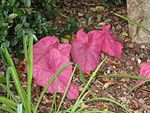
Eggplant, aubergine, brinjal, or baigan (GY) is a plant species in the nightshade family Solanaceae. Solanum melongena is grown worldwide for its edible fruit.

Lychee is a monotypic taxon and the sole member in the genus Litchi in the soapberry family, Sapindaceae.

Sweet corn, also called sweetcorn, sugar corn and pole corn, is a variety of corn grown for human consumption with a high sugar content. Sweet corn is the result of a naturally occurring recessive mutation in the genes which control conversion of sugar to starch inside the endosperm of the corn kernel. Sweet corn is picked when still immature and prepared and eaten as a vegetable, rather than field corn, which is harvested when the kernels are dry and mature. Since the process of maturation involves converting sugar to starch, sweet corn stores poorly and must be eaten fresh, canned, or frozen, before the kernels become tough and starchy.

Lake Placid is a town in Highlands County, Florida, United States. It is part of the Sebring Metropolitan Statistical Area. As of the 2020 census, the population was 2,360.
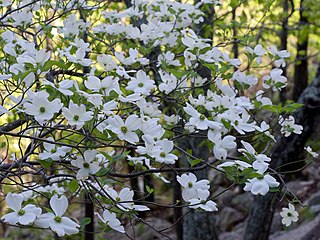
Cornus florida, the flowering dogwood, is a species of flowering tree in the family Cornaceae native to eastern North America and northern Mexico. An endemic population once spanned from southernmost coastal Maine south to northern Florida and west to the Mississippi River. The tree is commonly planted as an ornamental in residential and public areas because of its showy bracts and interesting bark structure.

The United States Patent and Trademark Office (USPTO) is an agency in the U.S. Department of Commerce that serves as the national patent office and trademark registration authority for the United States. The USPTO's headquarters are in Alexandria, Virginia, after a 2005 move from the Crystal City area of neighboring Arlington, Virginia.

Coreopsis is a genus of flowering plants in the family Asteraceae. Common names include calliopsis and tickseed, a name shared with various other plants.
Hidden Lake Gardens colloquially known as Hidden Lake 755 acres (3.06 km2), is a botanical garden and an arboretum operated by Michigan State University situated in the Irish Hills of southeast Michigan. The Gardens are known for their large collection of native and nonnative trees, shrubs and flowers. HLG was given to Michigan State University by Harry Fee in 1945. Today it is visited by nearly 45,000 people annually. One facet of the Hidden Lake Gardens mission is "To preserve an undeveloped area of the scenic Irish Hills, providing a place of beauty and inspiration for public enjoyment."
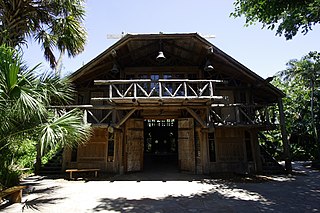
The McKee Botanical Garden is a non-profit, subtropical botanical garden in Vero Beach, Florida. It is located at 350 U.S. Highway 1, Vero Beach, Florida.
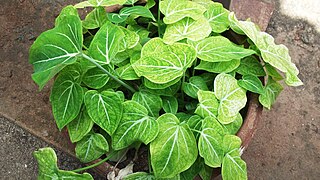
Caladium is a genus of flowering plants in the family Araceae. They are often known by the common name elephant ear, heart of Jesus, and angel wings. There are over 1000 named cultivars of Caladium bicolor from the original South American plant.

Vitis aestivalis, the summer grape, or pigeon grape is a species of grape native to eastern North America from southern Ontario east to Maine, west to Oklahoma, and south to Florida and Texas. It is a vigorous vine, growing to 10 m or more high in trees. The leaves are 7–20 cm long, suborbicular, and usually a little broader than long; they are variable in shape, from unlobed to deeply three- or five-lobed, green above, and densely hairy below. The flowers are produced at every 3rd node in a dense panicle 5–15 cm long. The fruit is a small grape 5–14 mm diameter, dark purple or black in colour. It is the official state grape of Missouri. Summer grape prefers a drier upland habitat.

An orange is a fruit of various citrus species in the family Rutaceae ; it primarily refers to Citrus × sinensis, which is also called sweet orange, to distinguish it from the related Citrus × aurantium, referred to as bitter orange.

Sorghum bicolor, commonly called sorghum and also known as great millet, broomcorn, guinea corn, durra, imphee, jowar, or milo, is a grass species cultivated for its grain, which is used for food for humans, animal feed, and ethanol production. Sorghum originated in Africa, and is now cultivated widely in tropical and subtropical regions. Sorghum is the world's fifth-most important cereal crop after rice, wheat, maize, and barley, with 61,000,000 metric tons of annual global production in 2021. S. bicolor is typically an annual, but some cultivars are perennial. It grows in clumps that may reach over 4 metres (13 ft) high. The grain is small, ranging from 2 to 4 millimetres in diameter. Sweet sorghums are sorghum cultivars that are primarily grown for forage, syrup production, and ethanol; they are taller than those grown for grain.

Caladium bicolor, called Heart of Jesus, is a species in the genus Caladium from Latin America. It is grown as a houseplant for its large, heart or lance-shaped leaves with striking green, white, pink, and red blotching. Hundreds of cultivars are available. It can be planted outside in USDA Hardiness Zone 10 as an ornamental. It is a problematic invasive species in Trinidad and Tobago, Guam, Micronesia, Palau, Hawaii and the Philippines, and naturalized populations can be found in most of the rest of the world's tropics, including Africa, the Indian subcontinent, southeast Asia and Malesia.

Watermelon is a flowering plant species of the Cucurbitaceae family and the name of its edible fruit. A scrambling and trailing vine-like plant, it is a highly cultivated fruit worldwide, with more than 1,000 varieties.

Caladium lindenii is a species of flowering plant in the family Araceae, named after Belgian botanist Jean Jules Linden.

Caladium lindenii 'Magnificum' is a cultivar of the species Caladium lindenii. It is differentiated from this species by having more pronounced veins on the leaves that are a creamy white coloration. The cultivar grows from a rhizome and is commonly grown as an ornamental plant.
The Monroe avocado is a commercial named cultivar of avocado that originated in south Florida.
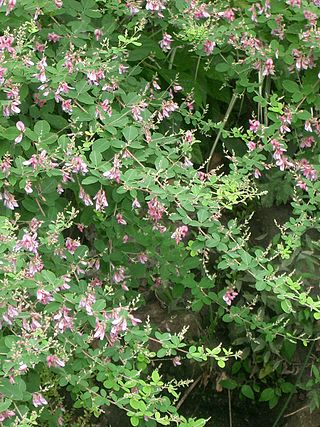
Lespedeza bicolor is a species of flowering plant in the legume family known by the common names shrubby bushclover, shrub lespedeza, and bicolor lespedeza. It is native to eastern Asia, ranging from southeastern Siberia to eastern China, Mongolia, Korea, and Japan. and it is widely grown as an ornamental plant. In some regions, such as the southeastern United States, it grows in the wild as an introduced and invasive species.

Theodore Luqueer Mead was an American naturalist, entomologist and horticulturist. As an entomologist he discovered more than 20 new species of North American butterflies and introduced the Florissant Fossil Beds in Colorado to the wider scientific world. As a horticulturist, he is best known for his pioneering work on the growing and crossbreeding of orchids, and the creation of new forms of caladium, bromeliad, crinum, amaryllis and hemerocallis (daylily). In addition, he introduced many new semi-tropical plants, particularly palm varieties, into North America. A comprehensive historical biography of his life and times was published in 2017.





